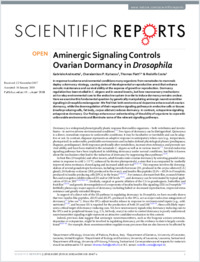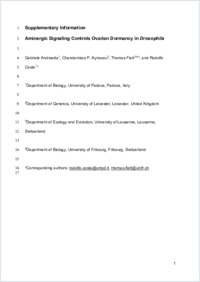Aminergic signaling controls ovarian dormancy in drosophila
- Andreatta, Gabriele Department of Biology, University of Padova, Italy.
- Kyriacou, Charalambos P. Department of Genetics, University of Leicester, United Kingdom
- Flatt, Thomas Department of Ecology and Evolution, University of Lausanne, Switzerland. - Department of Biology, University of Fribourg, Switzerland
- Costa, Rodolfo Department of Biology, University of Padova, Italy.
-
01.02.2018
Published in:
- Scientific Reports. - 2018, vol. 8, no. 1, p. 2030
English
In response to adverse environmental conditions many organisms from nematodes to mammals deploy a dormancy strategy, causing states of developmental or reproductive arrest that enhance somatic maintenance and survival ability at the expense of growth or reproduction. Dormancy regulation has been studied in C. elegans and in several insects, but how neurosensory mechanisms act to relay environmental cues to the endocrine system in order to induce dormancy remains unclear. Here we examine this fundamental question by genetically manipulating aminergic neurotransmitter signaling in Drosophila melanogaster. We find that both serotonin and dopamine enhance adult ovarian dormancy, while the downregulation of their respective signaling pathways in endocrine cells or tissues (insulin producing cells, fat body, corpus allatum) reduces dormancy. In contrast, octopamine signaling antagonizes dormancy. Our findings enhance our understanding of the ability of organisms to cope with unfavorable environments and illuminate some of the relevant signaling pathways.
- Faculty
- Faculté des sciences et de médecine
- Department
- Département de Biologie
- Language
-
- English
- Classification
- Biological sciences
- License
-
License undefined
- Identifiers
-
- RERO DOC 308966
- DOI 10.1038/s41598-018-20407-z
- Persistent URL
- https://folia.unifr.ch/unifr/documents/306475
Other files
Statistics
Document views: 105
File downloads:
- pdf: 176
- Supplementary material: 137

